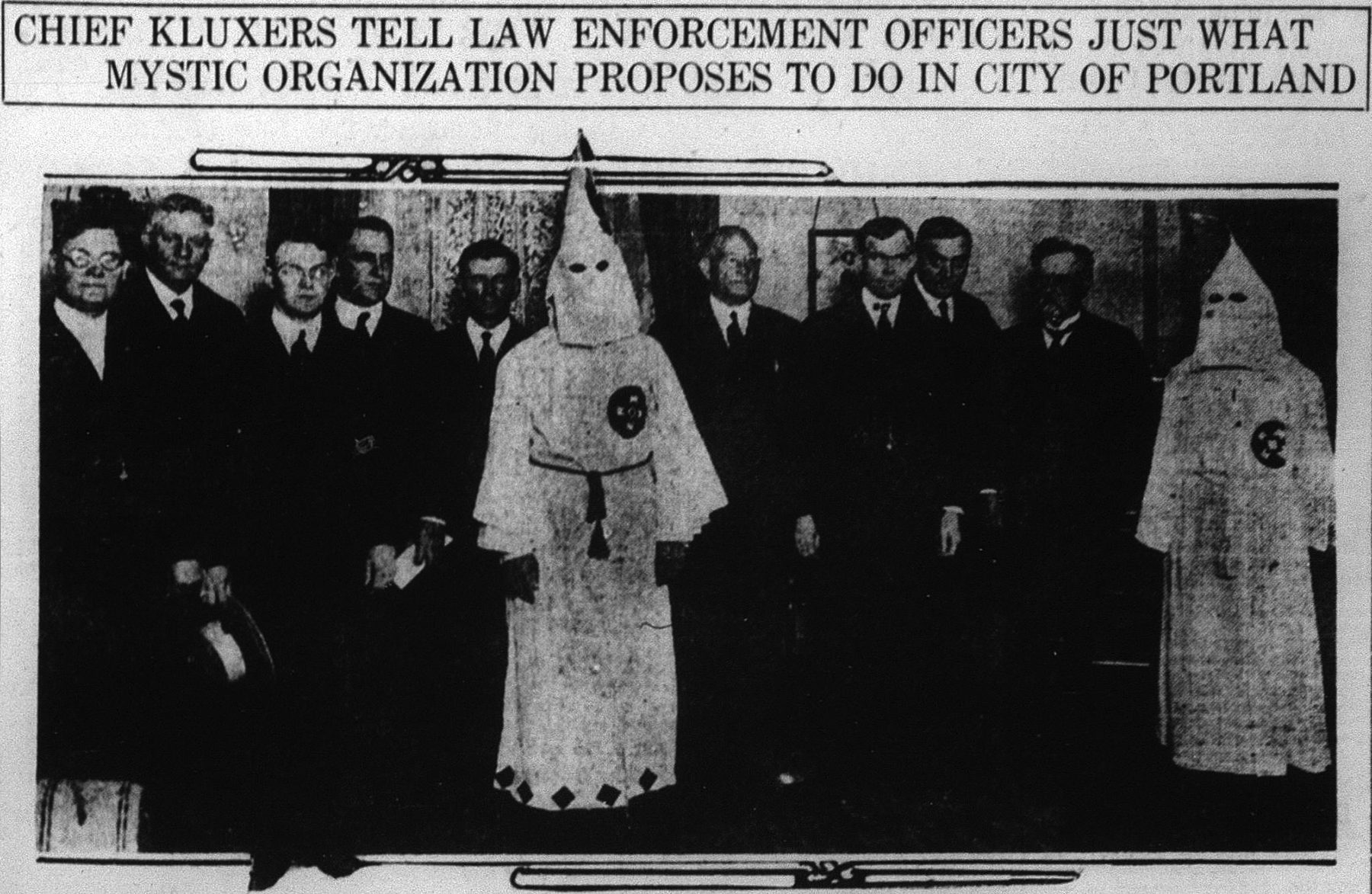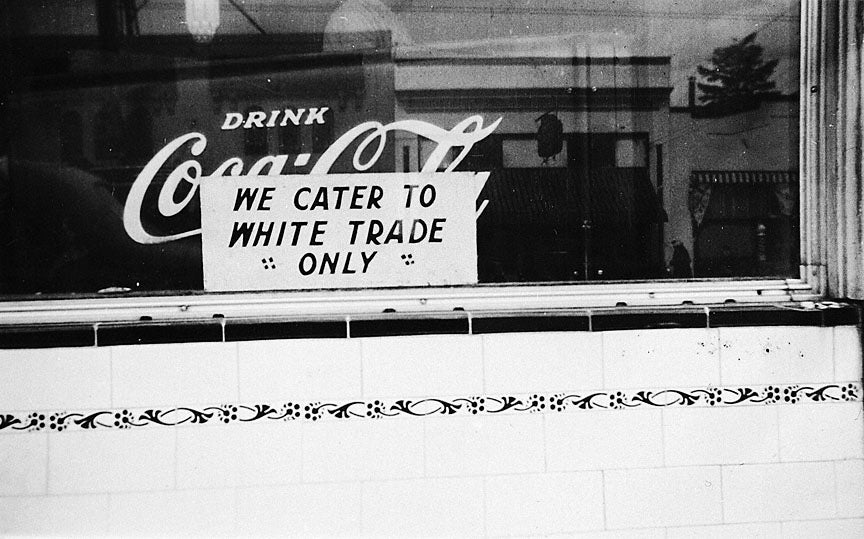Welcome to DU!
The truly grassroots left-of-center political community where regular people, not algorithms, drive the discussions and set the standards.
Join the community:
Create a free account
Support DU (and get rid of ads!):
Become a Star Member
Latest Breaking News
Editorials & Other Articles
General Discussion
The DU Lounge
All Forums
Issue Forums
Culture Forums
Alliance Forums
Region Forums
Support Forums
Help & Search
Feminists
In reply to the discussion: The U.N. Sent 3 Foreign Women To The U.S. To Assess Gender Equality. They Were Horrified. [View all]MADem
(135,425 posts)8. If you're black--hell yes Oregon. It was founded as a RACIST Utopia.
http://www.huffingtonpost.com/2015/01/22/oregon-racist_n_6523544.html
http://gizmodo.com/oregon-was-founded-as-a-racist-utopia-1539567040


Sign in the window of a Portland restaurant circa 1943 (Oregon Historical Society)
Read the whole thing--it'll curl your hair... and as we learned from #blm, plus ça change, plus c'est la même chose.
http://gizmodo.com/oregon-was-founded-as-a-racist-utopia-1539567040

When Oregon was granted statehood in 1859, it was the only state in the Union admitted with a constitution that forbade black people from living, working, or owning property there. It was illegal for black people even to move to the state until 1926. Oregon's founding is part of the forgotten history of racism in the American west.
Waddles Coffee Shop in Portland, Oregon was a popular restaurant in the 1950s for both locals and travelers alike. The drive-in catered to America's postwar obsession with car culture, allowing people to get coffee and a slice of pie without even leaving their vehicle. But if you happened to be black, the owners of Waddles implored you to keep on driving. The restaurant had a sign outside with a very clear message: "White Trade Only — Please."
It's the kind of scene from the 1950s that's so hard for many Americans to imagine happening outside of the Jim Crow South. How could a progressive, northern city like Portland have allowed a restaurant to exclude non-white patrons? This had to be an anomaly, right? In reality it was far too common in Oregon, a state that was explicitly founded as a kind of white utopia.
America's history of racial discrimination is most commonly taught as a southern issue. That's certainly how I learned about it while going to Minnesota public schools in the 1980s and 90s. White people outside of the South seem to learn about the Civil War and civil rights movements from an incredibly safe (and often judgmental) distance.....Today, while 13 percent of Americans are black, just 2 percent of Oregon's population is black. This is not some accident of history. It's a product of oppressive laws and everyday actions that deliberately excluded non-white people from a fair shot at living a life without additional obstacles being put in their way.
Waddles Coffee Shop in Portland, Oregon was a popular restaurant in the 1950s for both locals and travelers alike. The drive-in catered to America's postwar obsession with car culture, allowing people to get coffee and a slice of pie without even leaving their vehicle. But if you happened to be black, the owners of Waddles implored you to keep on driving. The restaurant had a sign outside with a very clear message: "White Trade Only — Please."
It's the kind of scene from the 1950s that's so hard for many Americans to imagine happening outside of the Jim Crow South. How could a progressive, northern city like Portland have allowed a restaurant to exclude non-white patrons? This had to be an anomaly, right? In reality it was far too common in Oregon, a state that was explicitly founded as a kind of white utopia.
America's history of racial discrimination is most commonly taught as a southern issue. That's certainly how I learned about it while going to Minnesota public schools in the 1980s and 90s. White people outside of the South seem to learn about the Civil War and civil rights movements from an incredibly safe (and often judgmental) distance.....Today, while 13 percent of Americans are black, just 2 percent of Oregon's population is black. This is not some accident of history. It's a product of oppressive laws and everyday actions that deliberately excluded non-white people from a fair shot at living a life without additional obstacles being put in their way.

Sign in the window of a Portland restaurant circa 1943 (Oregon Historical Society)
Read the whole thing--it'll curl your hair... and as we learned from #blm, plus ça change, plus c'est la même chose.
Edit history
Please sign in to view edit histories.
Recommendations
0 members have recommended this reply (displayed in chronological order):
29 replies
 = new reply since forum marked as read
Highlight:
NoneDon't highlight anything
5 newestHighlight 5 most recent replies
RecommendedHighlight replies with 5 or more recommendations
= new reply since forum marked as read
Highlight:
NoneDon't highlight anything
5 newestHighlight 5 most recent replies
RecommendedHighlight replies with 5 or more recommendations
The U.N. Sent 3 Foreign Women To The U.S. To Assess Gender Equality. They Were Horrified. [View all]
SunSeeker
Dec 2015
OP
Yes--I have been to Astoria quite briefly and I got the hell out of there as quick as I could.
MADem
Dec 2015
#11
Astoria isn't the same as Portland, FWIW. It's much more of a small town place. n/t
pnwmom
Dec 2015
#13
I will defend Portland. I recently was there and we stayed in a popular downtown hotel
randys1
Dec 2015
#26
I don't think Oregon is a place that has a special problem with gender equality.
pnwmom
Dec 2015
#16
Well, I think they are looking for access to services for women, and focusing on minority women
MADem
Dec 2015
#21
I understand exactly what you mean regarding Oregon. When I was in a "on the road" band,...
BlueJazz
Dec 2015
#23
It's just a feeling of comfort and ease that was missing. I felt like I didn't belong there.
MADem
Dec 2015
#24
I agree that is true for the US, but less so in Portland, Oregon than in many other areas of the US.
JDPriestly
Dec 2015
#6